- Home
- Simone Pond
The New Agenda
The New Agenda Read online
THE NEW AGENDA
Simone Pond
Ktown Waters Publishing
Copyright © 2014 Simone Pond
All rights reserved. Published in the United States by Ktown Waters Publishing, Los Angeles, CA.
ISBN-13: 978-0692208205
ISBN-10: 0692208208
Book design by damonza.com
www.simonepond.com
For PSJ
“Nothing gold can stay.”
- Robert Frost
“The truth is rarely pure and never simple.”
- Oscar Wilde
“Pride goes before destruction, a haughty spirit before a fall.”
- Proverbs 16:18
Ava
Inside the Administrative building in New Los Angeles, Joseph eases Ava’s chair back to a comfortable position. If today is like the previous times she’s hooked up to the mainframe, he knows she’s in for a long haul. “I’ll be right here, Ava.”
“I know.” She looks at Joseph and gives him one of her bravest smiles. “Just keep an eye on Grace.”
Their baby girl is sound asleep in her cradle tucked away in the corner. Ava doesn’t feel great about being away from her daughter for such a long period of time, but she knows it’s necessary. She made a promise to herself and to her people that she would locate Morray. The safety of their future depends on finding out where he wirelessly transferred his consciousness. She must make sure he never returns again. The days of the Los Angeles City Center aren’t that far behind them. It was only a year ago they had dismantled the armored walls and established a democracy among the people. They were still in the early stages of rebuilding and to think that someone as devious as Morray wouldn’t return to reclaim what was taken from him would be a dangerous assumption. No, Ava had to lock in on Morray’s virtual footprints and figure out a way to harness his identity matrix and keep him imprisoned forever.
“It’s not too late to get someone else to do this,” Joseph says.
“I told you, I know Morray better than anyone. I’ve seen into the depths of that man’s evil mind. If anyone’s going into find him, it’s me. I owe it to my people.”
“You’ve done more than your fair share, Ava. You freed them.”
“And that’s exactly why I want to make sure I find Morray, so they can stay free.”
Part 1
The Repatterning
Chapter 1
I wake up to the caw of a seagull. I can’t believe I fell asleep on the beach—especially today. A layer of sand sticks to the bare part of my legs where I rolled up my jeans. I try brushing off the grains with my baseball cap, but they’re stubborn. Sometimes I amaze myself by my utter lack of planning ahead. My arms and shins are already pinkish red and they’ll be tomato red in a few hours. Hiding my sunburn will be impossible—even if I wear long pants and a dinner jacket, Mother will know I was outside on Spray Day. After she specifically warned me to stay inside this morning. “Stay in class, William, even if your teacher is boring, even if the other boys pick on you, just stay inside—for your protection. You don’t want to upset your father.”
No, I don’t want to upset my father, but I always seem to do just that. He’s been locked in his downstairs lab—which is more like an underground facility—consumed with work, so maybe he won’t be around to notice I was outside today. When he’s down there for days on end, I start to worry about him. Sometimes I’ll sit outside his door and wait for him to take a break. I’m not entirely sure what goes on behind the big metal door, but I don’t have a good feeling about it. When he does emerge from his lab, I get about one minute of his undivided attention on the elevator ride up to the third floor, where he sends me off so he can get some rest. He’s been like this my entire life—all sixteen years.
The blue sky is starting to shift to a dusty gray and the beach is crowded, despite it being Spray Day. They say the spray helps maintain temperate weather conditions in Los Angeles, which I know isn’t true. I’ve been listening in on Father’s private conversations for years. I know the spray is a chemical compound containing minor levels of toxicity—just enough to affect the immune system so people are more susceptible to colds and viruses. It has something to do with meeting an “illness quota” so they can keep the economic system running smoothly—if nobody needs doctors or medicine the medical and pharmaceutical industries suffer, creating a domino effect.
“All for the greater good, Professor Morray,” one of Father’s colleagues often says with a snort-laugh. He reminds me of pig stuffed into a three-piece Gucci suit, and whenever he visits he leaves behind a scent of spicy cologne mixed with cognac and tobacco. He drinks non-stop and puffs cigars, even though Mother has asked him not to. Mother has never approved of Father’s colleagues, or Father for that matter. She only married him out of family obligation. “But because of him, I have you, my darling William,” she says, stroking my cheek when she kisses me goodnight.
I slip my backpack over my shoulders and grab my skateboard. It’s too late to go to school, and it’s too early to go home. I head down the boardwalk toward Venice where I can pick up some tablets. Overhead, the jets buzz and swoop across the sky for another round of spraying. Soon there will be puffy white chemical trails making crisscross lines that eventually spread and turn the sky to overcast. People stroll along as if nothing is happening. I put on my face mask and skate along the path. Father gave me the prototype face mask for my birthday earlier in the year, saying it’ll come in handy during the Repatterning. He’s been talking about the Repatterning for years and I’m glad we’re finally approaching the final phases so I can see what his years of research have been about. Lately, it’s been like Christmas morning with all the excitement at our house. I’d like to share some of that with Father, but he’s too busy. And John Dickson keeps getting in my way. I don’t like him, or the way he’s connected to Father’s hip. He’s too smart for his own good—graduated college when he was fifteen and before he reached twenty, he invented the first personalized medicine with his genome sequencing research. Father says he’s one of the most important men of our time and an integral component in the Repatterning, the perfect research partner. I know better than to compete with Dickson.
I stop and study the ocean for a second. The waves are huge—at least twelve feet. I’m mesmerized by their enormity and remove my noise-canceling headphones so I can hear them break. There’s no stopping a wave from crashing. Something about that thought makes me feel minuscule and gargantuan all at the same time.
“Hey, dickweed! What’s on your face? Too good to breathe the same air?”
Over on a nearby bench, Jack, a senior from the academy, and his group of rowdy friends are hanging out. They’ve taken off their navy-blue jackets and collared shirts; their skin, pasty white from being inside all winter, glares under the sun. Some of the morons are stripped down to their boxer shorts—inviting themselves to full-body sunburns. Jack and his crew have been picking on me ever since I can remember, even before I entered the academy. Our families run in similar circles—they call it “higher society” and I call it elitism. I’ve never cared about family names or putting on airs. I’m happiest in a t-shirt, jeans and black Vans. Mother makes me dress for dinner because of tradition, but she allows me to wear my Vans.
“You deaf, monkey tit?” shouts one of Jack’s friends.
I have to make a choice—either I step up and face them, or keep skating. If I stand up to them, they’ll beat the crap out of me, which I’ll have to explain, in addition to the sunburn. If I ignore them, they’ll chase me down and steal my skateboard—it’s my fifth one this year. I’m not in the mood for a confrontation with these jokers. I just want to take some tablets and watch the sunlight dance on the waves, but I can’t say that t
o these guys. I step off my skateboard and shove it in their direction, accidentally tripping a stout man in a bright yellow Speedo. The guys bust up laughing. Speedo man stands up and marches toward me. I dart between the crowd with him chasing behind, huffing and puffing—the polluted air works in my favor to slow him down. I skid into a Native American shop and run to the back to hide behind a rack of airbrushed t-shirts.
There’s a tap on my shoulder.
“Can I help you?” says the young sales woman.
She has smooth golden brown skin and long straight black hair. I hold up a large t-shirt with the face of a gray wolf peering back at me.
I remove my face mask and hand her the shirt. “I’d like to buy this.”
She digs through the rack and hands me a small. “This looks more like your size.”
I have a sudden urge to tell her I’m still growing. In fact, I’m in the midst of a growing spurt and soon I’ll need that large, but I keep my mouth shut and follow her to the register.
“Anything else?” she asks.
“Some tabs.”
“Are you old enough?”
I show her my I.D. to prove I’m old enough. I want to pull her across the counter and plant a kiss on her lips to show her I’m a man and not some silly kid. She sifts through the drawer and pulls out two tablets. I pop one into my mouth. “What time do you get off work?”
She giggles and pats to top of my baseball cap and returns to the floor. I feel like a dejected wimp. I leave the t-shirt on the counter and walk away. It’s safe to go back outside; Jack and his gang have moved on to something else.
“Hey, kid, you forgot your shirt!” she calls out.
I walk on, too humiliated to turn around to tell her to keep the heinous thing.
I turn down an alley, to avoid bumping into Jack and his crew again, and walk among the homeless people unearthing rotten and soggy contents from the reeking trash bins. There’ve been a lot more homeless people in the last six months. Not the typical leathery sunken-in men oozing of stale booze and piss. The most recent crops are families. They’ve been setting up campsites and living in tents throughout neighborhood parks, and the cops can’t do anything about it because when one family leaves, another one moves in.
“Shanty Towns,” Mother explained when these campsites first started appearing. I asked why we couldn’t help them—with all of our money we must have some to spare—but Father shook his head and said that’s not how the system works.
“Can’t we change the system? What’s the use of having all of this money if we can’t do something useful with it?”
Father smiled and said, “We already are, son. Inauguration Day is coming.”
I take Speedway and go down one of the secluded walkways. Most of the houses are in shambles now. I’m hoping to see Bo Jay playing his busted up guitar. I offered to get him a new one once, but he said “this old ax cuts just fine.” Today he’s sitting on a lawn chair singing to the people passing by. I stop and listen to him sing a bluesy tune about some woman who did him wrong. He looks like he’s straight out of the Mississippi Delta.
“How’s it going, Bo Jay?” I reach out to shake his chafed hand.
Most of Bo Jay’s teeth are missing and his dark skin is worn and weathered from years of too much sun and salty sea air.
He smiles. “Above ground, so I must be doin’ somethin’ to keep this upside down frown.”
I dig into my backpack and pull out a bag of beef jerky and a bottle of orange Shasta. Bo Jay only drinks out of glass bottles. “Here you go, dude.”
“My man, my man. You is good peeps, Willie. You keep it real for the rest of ‘em.” He starts playing a blues riff and nods.
“You sure you don’t need some cash?” I ask him the same thing every time.
He gives me the same answer, looking up at the sky and taking in a full breath of air. “Nah, I gots what I needs.”
While he’s fumbling in his pocket for his bottle opener, I slip a few twenties into his torn up guitar case.
“I’ll see you around, Bo Jay.”
“Keep on the good foot, my man.”
By the time I reach the end of Washington Pier, I’m tripping hard. I keep my cap pulled low—I don’t want to encounter any creeps out here today. I’m looking for something amazing to stare at until dinnertime. I sit on the railing, letting my feet dangle over the side, and turn up the dial on the noise-canceling headphones until the silence envelops me. The crests of waves ripple and glimmer, creating a radiant kaleidoscope of light—each ray tickles my skin and seeps into my cells, creating a waltz inside my body. I release the ten pounds of air I’ve been holding in my lungs for days…
I don’t know how long I’ve been sitting here, but the men who were fishing have disappeared. So has the sun. I take off my headphones, jump back down onto the pier, and head toward the boardwalk.
“Pretty day, despite the spray.” A girl with fried blonde hair and an orangish tan approaches me. I can’t tell if she really looks like that, or if my vision is still enhanced from the tablet.
“Where’d everyone go?” I ask.
“Inside. They, like, made the announcement like twenty minutes ago.” She walks next to me, wearing only a white bikini.
“What announcement?”
“Spring curfew.”
“Already?”
“It’s almost six o’clock. Most peeps are home gettin’ eats and watchin’ shows.”
Six o’clock? That tab was a strong one.
“You’ve been sitting on that ledge like a statue for like the last five hours.” She smiles, twirling a chunk of her frizzled hair between her fingers.
“Have you been spying on me?”
“More like fascinated by you. My girlfriends said you weren’t real. But I could see your energy.”
Oh, great. One of those freaks—Energy Seekers. Auras and all that bullshit. I don’t wait for her to ask if I want to hear my future. “Look, I’m late. I don’t want to get caught out here…”
“With me, right?”
“No, I mean after curfew. I’m late for dinner. Do you need some money or something?”
She stops walking and stares at me with a look of pain settling over her orange face.
“I’m sorry. But I don’t know what you want,” I tell her.
“I was just, like, looking for someone interesting to, like, talk to or something.”
“I’m not that person.” I keep walking.
“Hey, wait,” she calls out.
“Yeah?”
“Do you have any spare change?” She smiles, her indigo blue eyes twinkling—or at least I think they are. I hand her a few twenties, tip my cap, and take off down the pier.
“Thanks, William,” she shouts.
I want to ask her how she knows my name, but I’m late. Hopefully I can find a taxi to get back to Bel Air before the dinner bell rings at 6:45 p.m.
*
The taxi driver drops me off at the gated entrance on Sunset—taxis aren’t permitted beyond the gate any more. Like all the other streetlights, the neon blue sign that reads “Bel Air” is turned off, giving the neighborhood an eerie vibe. Conserving energy efforts are in effect—another component of the Repatterning. Though I’m not sure how much energy will be saved by not lighting up the six blue cursive letters. It does send out a message, one that doesn’t feel good. A lot more places are starting to resemble Detroit after its collapse thirteen years ago—vacant and abandoned.
“Start with small things,” Father tells his colleagues. “People don’t notice change when you take baby steps, but they’ll overreact if you do too much at once. We can rely on humans’ ability to adapt to anything over time.”
When Father speaks like this, the pig-faced man in the too-tight Gucci suit nods in approval, puffing on his cigar. “Always considering every angle, Professor. You’re a true genius.” The last thing these men of “higher society” want is a revolution, or at least one they’re not controlling. They could con
tain an uprising in a heartbeat, but they don’t want to waste resources when they can get the masses to do the work for free. So I’ve heard them say.
The sun is long gone and the streets are empty. I remember when there’d be cars lined up for miles on Sunset and Beverly Glen, people waiting ten or fifteen minutes between light intervals with frowns on their faces, taking drags off their electronic cigarettes. Traffic has died down the last few months due to the Career Reshaping phase. The goal was to have more people working from home. That was one change most people didn’t seem to mind—not being forced to commute into work every day. There was a little backlash about the mandated wrist strap monitor. Nobody wanted every single minute of their daily activity reported back to their corporations, especially when they had plans to sneak in a quick trip to the mall or the beach. But when the corporations implemented the awards program, people started clocking in exorbitant chunks of time in front of their computers to get more points. Nobody’s sure what the points are for, but they stopped sneaking out during work hours.
I use my flashlight app to illuminate a path up the hill. The tab is still running its course through my system because the trees are swaying in unison to my heavy breathing. I take a few deep breaths to get my panting under control. Doing anything uphill is a battle for my scrawny muscles. I hate sports and make a point to skip every physical activity class. Skateboarding keeps me somewhat in shape, but I could benefit from some strength training. The entire street is dark except for our place. Light beams from every window and the fountain in the middle of the circular drive is lit up like the Fountains of Bellagio. So much for conserving energy.
I reach the gatehouse hoping Mark can sneak me in, but he’s already gone. People are taking the curfew thing pretty seriously—they don’t want points taken away. The fence is too high to climb and I’d definitely puncture something on the iron spikes at the top. I have no choice but to call the house. I laugh whenever I call where I live a house—it’s more like a castle. I press the button on the video box and Old Martha’s raggedy, ancient face appears on the monitor. She’s been with the family for decades—probably came with the castle. She’s been taking care of me since I was a baby. Between Mother’s travels and Father living in his research facilities, Old Martha and I have spent a lot of time together. She’s rickety, but cool.

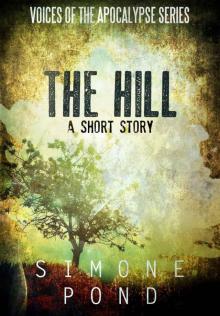 The Hill: A Short Story (Voices of the Apocalypse Book 3)
The Hill: A Short Story (Voices of the Apocalypse Book 3) River of Magic (The Mysterium Chronicles Book 2)
River of Magic (The Mysterium Chronicles Book 2) The New Agenda
The New Agenda Fire and Fate: Part 1 & 2 (Dragons of Galicia)
Fire and Fate: Part 1 & 2 (Dragons of Galicia) Sacred Light (Armor of Magic Book 1)
Sacred Light (Armor of Magic Book 1) Fire and Blood (Dragons of Galicia Book 3)
Fire and Blood (Dragons of Galicia Book 3) Wrath of Magic (The Mysterium Chronicles Book Book 3)
Wrath of Magic (The Mysterium Chronicles Book Book 3)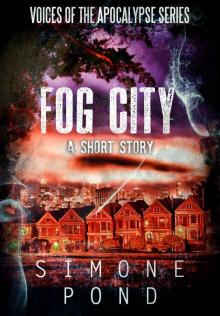 Fog City: A Short Story (Voices of the Apocalypse Book 5)
Fog City: A Short Story (Voices of the Apocalypse Book 5)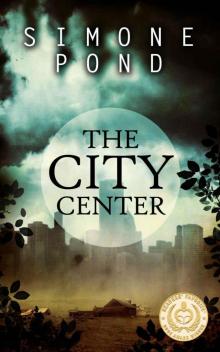 The City Center (The New Agenda Series Book 1)
The City Center (The New Agenda Series Book 1) Edge of Light (Armor of Magic Book 3)
Edge of Light (Armor of Magic Book 3) Exodus of Magic (The Mysterium Chronicles Book 1)
Exodus of Magic (The Mysterium Chronicles Book 1) Hidden Sight (Coastview Prophecies Book 1)
Hidden Sight (Coastview Prophecies Book 1)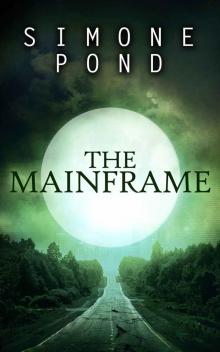 The Mainframe (The New Agenda Series Book 3)
The Mainframe (The New Agenda Series Book 3)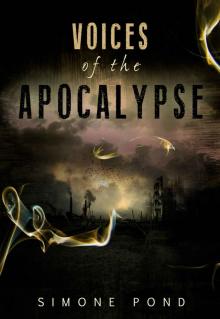 Voices of the Apocalypse: The Collection
Voices of the Apocalypse: The Collection Fire and Chains (Dragons of Galicia Book 2)
Fire and Chains (Dragons of Galicia Book 2) Beyond Sight (Coastview Prophecies Book 2)
Beyond Sight (Coastview Prophecies Book 2)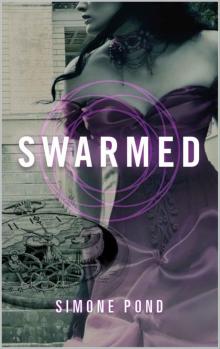 Swarmed
Swarmed